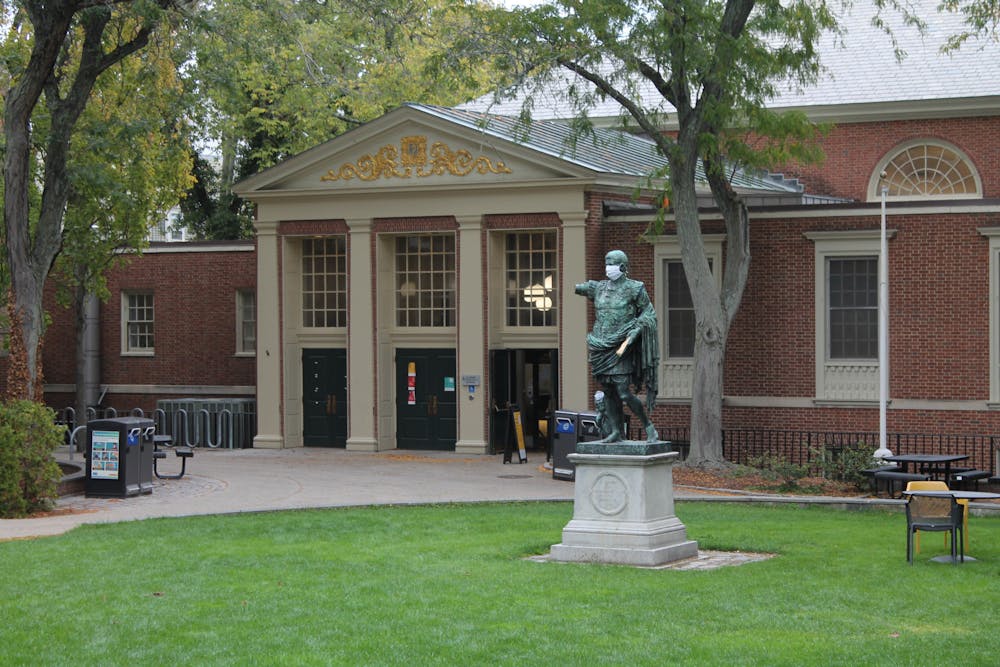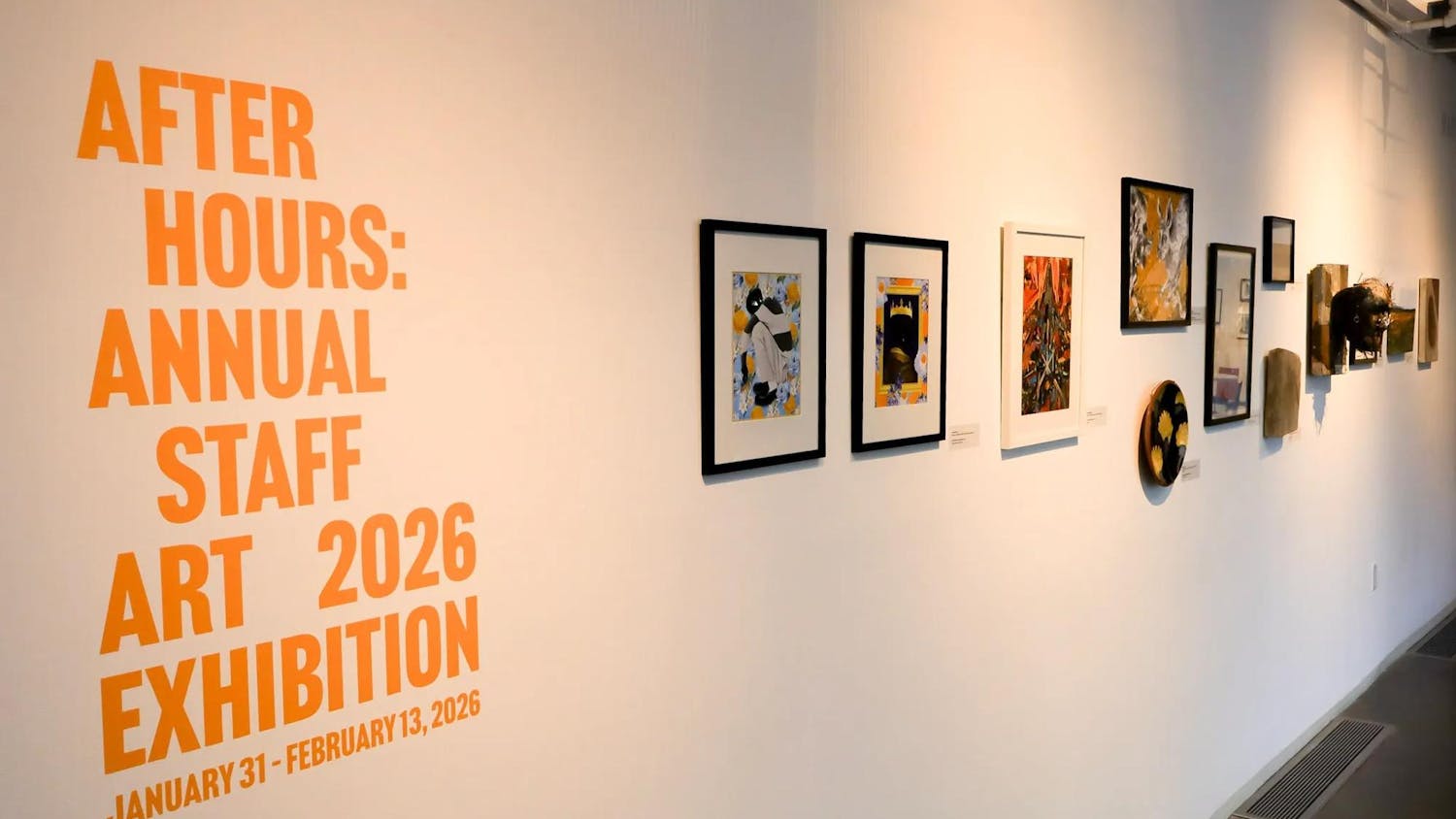After a year without in-person dining, the Sharpe Refectory and Verney-Woolley dining halls are back to full-fledged operations — a hallmark of the college experience. But the staff who prepare, cook and serve the University’s meals say that the return to normalcy has stretched an understaffed workforce to its limits. Sanitary practices suffer and stations remain closed as pre-existing issues with dining services are exacerbated by hiring difficulties.
Twelve Brown Dining Services workers spoke to The Herald on the condition of anonymity so they could discuss working conditions without fear of retribution; each worker has been given a pseudonym to protect their identities. They described a number of issues stemming from understaffing, but also detailed long-standing issues in the flagship dining halls such as broken equipment, food waste and a consistent lack of communication about who bears responsibility: BDS or Bon Appétit, an outside contractor that serves as a “partner and advisor” in dining.
BDS is working to hire new staff, according to an email sent to The Herald by George Barboza, director of Dining Programs. But like the majority of food service companies, BDS is facing difficulties in filling vacant positions. In the meantime, Barboza wrote that BDS is “balancing” responsibilities and continuing to prioritize sanitation.
Stacks of dishes, pots and pans
Dining halls, workers said, have not been fully staffed in years — and multiple workers noted that numbers had declined even before the pandemic. The workforce took a further hit after a wave of retirements during the pandemic. But every worker interviewed agreed: BDS has never employed so few people to serve so many students.
For the dish room at the V-Dub to function, it needs at least three people, according to a V-Dub worker referred to here as David. But in the morning, two people work in the dish room, and at night, only one does, he said. That leaves one person to load and unload the dishwasher — a sanitation problem, David added, as the same hands that loaded dirty plates then unload clean ones.
“If the city comes and sees that,” he said, “we would get in big trouble.”
Without enough workers in the dish room, time runs out quickly. Multiple workers showed photos of dishes, pots and pans towering high, left to be cleaned the next morning. Other auxiliary duties suffer for being short-staffed too, David said, such as sweeping and mopping the floor.
“To me, that’s like calling mice and roaches in,” he said.
Leaving dishes for the morning in turn limits the kitchen’s ability to serve meals in a timely fashion, said a worker in the V-Dub kitchen referred to here as John.
Temporary workers hired in the Ratty addressed a similar problem where dishes from the night before remained stacked up into the next morning, according to a worker in the Ratty kitchen referred to here as Jim.
Still, the Ratty’s kitchen has other problems stemming from understaffing, workers say. “Prep rooms” likely have less than two-thirds or one-half of the staff they should have, according to another worker in the Ratty kitchen referred to here as Francis. The numbers in the kitchen as a whole, he added, are similarly diminished. Just one absence can upend a kitchen, Jim said.
“You would think there’s armies of people producing food downstairs, and there are handfuls of us at times,” said a staffer who works in the Ratty referred to here as Peter. The lack of staff has diminished the quality of the food and the number of options available, according to Francis and another Ratty kitchen worker referred to here as Bruce.
On the front-facing end of the Ratty — for the workers who interact with students — understaffing has likely led to clutter on the buffet lines and at the salad bar, the closure of the pizza station at dinner, general uncleanliness and a number of other problems according to Peter, Jim, Bruce and another Ratty kitchen worker referred to here as Deborah.
No front-facing workers at the Ratty agreed to an interview with The Herald. But a front-facing V-Dub worker referred to here as Mary said that understaffing has forced her to do the job of “two or three” people, in addition to preventing her from rotating between different stations on different days. The repetitive work causes back pain, she said.
Barboza wrote to The Herald that BDS is “balancing assignments” across its professional, student and temporary positions to meet the needs of the University community while it faces understaffing.
“We deeply appreciate the hard work, dedication and flexibility of all dining staff, especially during peak periods such as this one,” he said, explaining that early-semester peaks of diners tend to stabilize in mid-October.
Barboza added in his email that BDS considers health, safety and cleanliness “essential priorities,” stressing the department’s commitment to ensuring “healthy and safe conditions” for both BDS workers and community members in line with regulations set by the Rhode Island Department of Health.
“We see everything posted on Instagram”
The understaffing, workers said, has taken its toll.
Workers described being more tired than they had ever been, as well as new levels of stress and a sense of disappointment that they can’t do better, especially when students openly complain. The staff in the dining halls are doing their best, nearly every worker interviewed stressed.
“Some days it just feels like there’s a rain cloud in the Ratty,” Jim said.
“We see everything posted on Instagram,” he added. “It’s funny, but … they don’t know what’s going on behind the scenes.”
The complaints also come as BDS staffers work what they said is an unprecedented amount of overtime — going up to 20 hours of overtime per week for some workers, Peter said.
“Before, you couldn’t get people to say no to overtime,” Jim said. “Now, people are turning it down left and right.”
Deborah said that she believed she could likely add a full day of overtime to her schedule every week — but that the stress of working while understaffed leaves her “burnt out.”
While workers burn out, they say that the University has been slow to hire new staff. Most estimated the process takes around two months, and multiple workers wondered why the University didn’t focus on rebuilding its workforce once it decided to bring back its full student body earlier this year. Staffing issues, Bruce said, extend to the entirety of BDS — not just the Ratty and V-Dub.
“I know it’s hard to staff everywhere,” Francis said. But “we’re in desperate need of help right now.”
Both Deborah and Peter mentioned that they had heard anecdotes about potential candidates backing out because of fears of the continuing pandemic, or the University’s vaccine mandate. Other workers, Francis said, are accepting positions and then dropping them soon after.
Nationwide, the food service industry is struggling to find workers, a problem economists attribute to a number of factors, including the prevalence of the Delta variant and mismatches between employer and employee expectations.
The University, Barboza wrote, is not an exception to this trend.
“Brown Dining has faced challenges finding and bringing aboard the right team members, given the significant impacts of the COVID-19 pandemic on the employment market,” he wrote, noting that the efforts to bolster hiring coincide with the University resuming full operations in its dining halls for the first time since March 2020.
The University is working “aggressively and proactively to recruit new staff and fill all open positions,” he added, drawing on professional, student and temporary workforces. Since July, the University has added 27 new people to BDS.
Overtime, he noted, is “always optional” and pays at one-and-a-half or double time.
Barboza did not specifically comment on the University’s hiring timeline for dining workers.
“The freezer’s sitting broken in the basement”
Issues with understaffing aren’t the only problem: Much of the dining halls’ infrastructure, workers said, is inadequate or broken, and new equipment often takes too long to be installed.
In early August, the Ratty’s freezer caught fire. Nearly two months later, it remains unfixed, workers said. Mobile freezers are currently in use in its place, while the expansive freezer space is used for dry storage. When the V-Dub received a new combination oven, it took multiple weeks to get plugged in, John said. As of Wednesday, two new grills had sat on the loading dock of the Ratty for two weeks without being plugged in — a relatively simple process, multiple workers said. Of the two grills currently installed, one is broken, and the other leaks gas, Peter said. And for months, the Ratty did not have consistent hot water, workers said. Requests for repairs, workers added, tend to go unfulfilled for weeks at a time. Barboza did not specifically comment on perceived maintenance issues when asked by The Herald.
At the V-Dub, a lack of fridge space also means the kitchen sometimes faces challenges regulating food temperature, according to John.
Other small pieces of equipment, such as spatulas or tools to clean out the fryers, often go missing, John said. As of late, he’s turned to using a coat hanger to clean out the fryers.
“It doesn’t take much to be missing to make things difficult,” said Bruce, who also has experience at the V-Dub. Mary noted that on the front-facing food service side, workers had the equipment they needed.
Over-ordering and limited fridge space, some workers said, also lead to considerable food waste. Peter estimated that the amount of food sent straight to compost could be measured by the “metric ton.”
Ensuring timely repairs, Peter said, could be the job of a number of different groups. Bon Appétit, an outside group that the University contracts to help manage its dining operations, may bear responsibility — but it could also lie with the Department of Facilities Management, or with another arm of the University entirely.
“You can’t get either side to admit who’s responsible for what,” Peter said.
Communication, a number of the workers agreed, often proves dysfunctional — from BDS, from Bon Appétit and between the two parties. Menu changes, they said, come at the last minute, and managers can cross signals. Institutional knowledge, Peter added, has dissipated quickly.
“It feels like there’s nobody in charge,” Deborah added. “I don’t know who’s doing what, who’s in charge of what.”
BDS, Barboza wrote, operates under the University’s Division of Finance and Administration, and is “ultimately responsible for all decisions in dining related to staffing, menus and more.” Bon Appétit is a “partner and advisor on key dining priorities,” he said.
Barboza did not specifically address questions regarding faulty equipment or food waste in his email to The Herald. In response to a request for comment, Director of Communications for Bon Appétit Jenny Slafkosky referred The Herald to Barboza, who also did not address the workers’ claims about communication between the different groups responsible for running dining at Brown.
Former Executive Vice President for Finance and Administration Barbara Chernow ’79 retired this September. Sarah Latham, who held a similar role at the University of California, Santa Cruz, will replace her in January 2022.
“They’re not really listening to you”
On Nov. 1, BDS’ union contract will expire. A worker who is involved with the union listed their biggest priorities as labor, equipment, raises and health insurance premiums.
“We’ve had a collegial and productive rapport with the union since the start, and we expect that to continue,” Barboza wrote.
Most of the changes needed to solve current problems, largely rooted in understaffing, will come through pieces of contract negotiations aimed at getting things “back to the way they were,” said Rabbit Hoffinger, a lead cook at the Ratty and a union steward who is not involved with this round of negotiations. The current contract, which was agreed to three years ago, wasn’t designed for the conditions that emerged from the COVID-19 pandemic, he said.
Aside from negotiations, the union is primarily aiming to protect BDS workers from disproportionate discipline while “they’re working as hard as they humanly can,” Hoffinger said.
Still, the vast majority of the workers interviewed, without mentioning a new contract, said that they hoped the University would address staffing and equipment issues.
A number added that they thought students were the main drivers of change, as opposed to BDS workers themselves.
“The only time when Brown ever listens to us is when the students get involved,” John said.
“Once (students) find something out and it gets out in the public, they listen to (them),” said Jim.
The workers also didn’t levy much blame on the upper levels of University administration, doubting that they even knew about the conditions inside their own dining halls.
Barboza wrote that BDS encourages open dialogue and maintains an “open-door” environment for staff to raise questions and concerns.
But a number of workers said that their complaints weren’t making it past their managers and wondered about the incentive for leaders in the department and at Bon Appétit to tell key administrative figures about difficulties they face.
“You complain to the managers, it feels like they’re listening to you,” Deborah said. “But they’re not really listening to you.”
“I know our main bosses and their bosses know, but I don’t know how far it goes,” Jim said.
“I figure it can’t go on forever,” he added. “It’s got to break eventually.”

Will Kubzansky was the 133rd editor-in-chief and president of the Brown Daily Herald. Previously, he served as a University News editor overseeing the admission & financial aid and staff & student labor beats. In his free time, he plays the guitar and soccer — both poorly.





